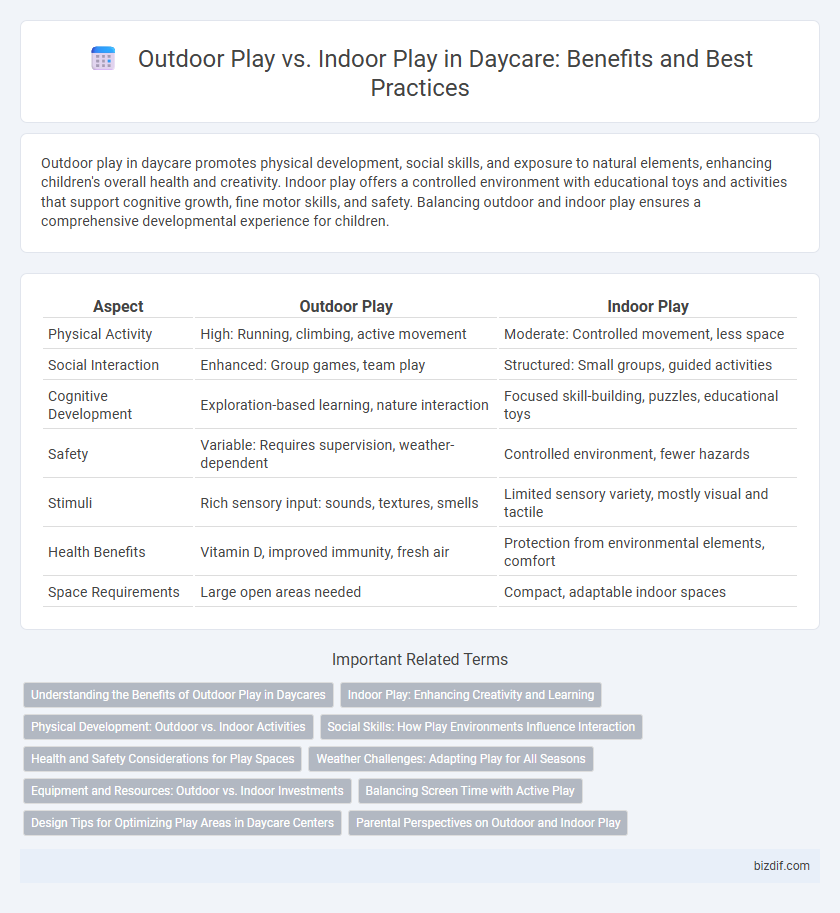Outdoor play in daycare promotes physical development, social skills, and exposure to natural elements, enhancing children's overall health and creativity. Indoor play offers a controlled environment with educational toys and activities that support cognitive growth, fine motor skills, and safety. Balancing outdoor and indoor play ensures a comprehensive developmental experience for children.
Table of Comparison
| Aspect | Outdoor Play | Indoor Play |
|---|---|---|
| Physical Activity | High: Running, climbing, active movement | Moderate: Controlled movement, less space |
| Social Interaction | Enhanced: Group games, team play | Structured: Small groups, guided activities |
| Cognitive Development | Exploration-based learning, nature interaction | Focused skill-building, puzzles, educational toys |
| Safety | Variable: Requires supervision, weather-dependent | Controlled environment, fewer hazards |
| Stimuli | Rich sensory input: sounds, textures, smells | Limited sensory variety, mostly visual and tactile |
| Health Benefits | Vitamin D, improved immunity, fresh air | Protection from environmental elements, comfort |
| Space Requirements | Large open areas needed | Compact, adaptable indoor spaces |
Understanding the Benefits of Outdoor Play in Daycares
Outdoor play in daycares promotes physical development, enhances motor skills, and supports sensory exploration by providing children with fresh air and natural surroundings. Exposure to sunlight helps in vitamin D synthesis, crucial for bone health and immune function, while unstructured outdoor activities foster creativity and social interaction among peers. Compared to indoor play, outdoor environments offer diverse stimuli that improve attention span and reduce behavioral problems, contributing to overall emotional well-being in early childhood.
Indoor Play: Enhancing Creativity and Learning
Indoor play in daycare settings significantly enhances children's creativity and cognitive development through structured activities and accessible educational materials. It provides a controlled environment where imaginative play, problem-solving tasks, and sensory experiences promote language acquisition, fine motor skills, and social interaction. Research indicates that indoor play supports early literacy and math skills, fostering critical thinking and emotional regulation essential for school readiness.
Physical Development: Outdoor vs. Indoor Activities
Outdoor play significantly enhances children's physical development by promoting larger muscle movements, coordination, and cardiovascular health through activities like running, climbing, and jumping. Indoor play supports fine motor skills and balance via structured tasks such as puzzles and tabletop games, but typically involves less vigorous physical exertion. Combining both environments optimizes gross and fine motor development, fostering overall physical growth in early childhood.
Social Skills: How Play Environments Influence Interaction
Outdoor play in daycare settings significantly enhances social skills by encouraging group activities that foster cooperation, communication, and conflict resolution among children. Indoor play environments, while beneficial for imaginative and structured interactions, often limit physical space, reducing opportunities for dynamic social engagement. Exposure to diverse play environments supports the development of empathy, sharing, and teamwork, essential components of early childhood social competence.
Health and Safety Considerations for Play Spaces
Outdoor play in daycare settings offers significant health benefits, including improved physical activity, vitamin D absorption, and reduced exposure to indoor allergens, while requiring careful monitoring of weather conditions and safe, secure play equipment. Indoor play spaces must maintain strict hygiene standards, ensure proper ventilation to prevent the spread of germs, and provide soft, non-toxic materials to minimize injury risks. Balancing outdoor and indoor play by adhering to safety protocols and health guidelines promotes overall child well-being and developmental growth.
Weather Challenges: Adapting Play for All Seasons
Outdoor play in daycare offers children essential physical activity and sensory experiences, but weather challenges such as rain, extreme heat, or cold require flexible planning. Indoor play areas should be equipped with engaging, weather-appropriate materials to maintain developmental benefits when outdoor activities are limited. Effective daycare programs implement adaptive schedules and versatile play options to ensure consistent stimulation regardless of seasonal weather conditions.
Equipment and Resources: Outdoor vs. Indoor Investments
Investing in outdoor play equipment, such as climbing structures, sandboxes, and natural exploration areas, promotes physical activity and sensory development in daycare settings. Indoor play resources often consist of educational toys, art supplies, and quiet reading corners that support cognitive and creative skills. Balancing expenditure between durable outdoor installations and versatile indoor materials ensures a comprehensive developmental environment for children.
Balancing Screen Time with Active Play
Balancing screen time with active play in daycare settings is essential for healthy child development, as excessive indoor screen exposure can hinder physical growth and social skills. Outdoor play promotes motor skills, improves mood, and encourages exploration, making it a critical complement to indoor activities. Structured schedules that alternate screen use with vigorous outdoor play help ensure children benefit from both cognitive stimulation and physical activity.
Design Tips for Optimizing Play Areas in Daycare Centers
Outdoor play areas in daycare centers should incorporate natural elements like grass, sand, and water features to stimulate sensory exploration and physical development, while ensuring safety with non-toxic materials and secure fencing. Indoor play spaces benefit from flexible layouts with modular furniture and ample lighting to support diverse activities, enhance motor skills, and provide quiet zones for rest and focus. Integrating varied textures, colors, and age-appropriate equipment maximizes engagement and promotes healthy cognitive and social growth in children.
Parental Perspectives on Outdoor and Indoor Play
Parental perspectives on outdoor and indoor play often highlight the benefits of outdoor play for children's physical health, social skills, and connection with nature. Many parents prioritize outdoor activities to encourage exploration, motor development, and reduce screen time, while indoor play is valued for creativity, safety, and structured learning. Balancing outdoor and indoor play in daycare settings addresses parents' concerns about weather, supervision, and providing diverse developmental opportunities.
Outdoor play vs indoor play Infographic

 bizdif.com
bizdif.com